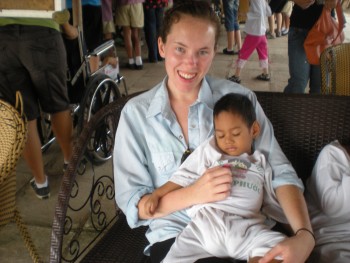Helping the Disabled in Vietnam

Laura Gilroy '11 and Anh, a child at the Tien Phuoc orphanage, on a horseback riding field trip.
Details
Tall, fair-skinned and freckled, Laura Gilroy stands out wherever she goes in Vietnam. The first week she arrived in the country, two people asked her to pose in a photo with them. To try to blend in she wears a face mask and sunglasses, but still receives preferential treatment from strangers for being a foreigner, such as free motorcycle rides, big meals with endless helpings, and even a free raincoat during a storm.
Gilroy, a pre-med anthropology major, has been working at Tien Phuoc, an orphanage for physically handicapped children in Ho Chi Minh City. Some have cerebral palsy, some have Down syndrome, and others have unknown conditions. It is suspected that some of the children have been affected by Agent Orange. Gilroy has been helping feed and care for the kids as well as doing physical therapy with them.
Though most of the children, who range in age from infants to teenagers, are orphans, some mothers also live there, working as nurses in exchange for their children's care at the center.
Additionally, Gilroy has visited a number of HIV/AIDS clinics and shelters for adults and children in various areas of the city, trying to get a sense of what it is like for Vietnam's poorest citizens living with HIV/AIDS, a task that she says has not been easy.
She has arranged to spend her last five weeks in Vietnam at the Tan Dinh free clinic shadowing doctors, helping perform physicals, and working with HIV-positive patients. She will also be visiting other shelters and pre-natal care centers as research for her impending senior thesis, which will explore the interrelations of gender and public health in Vietnam.
"All in all," says Gilroy, "I have traveled pretty extensively around the city working and checking out new places, trying to get a handle on what the medical system—or lack thereof—is like for the average, very poor Vietnamese city dweller."
Gilroy has had a lot of help from some very friendly and accommodating people, but has also had to make a lot of compromises, including forgoing the comforts she was used to in the U.S. (a functioning kitchen, no roaches) as well as ideological differences, particularly regarding human rights and gender equality.
"Day in and day out, I have observed, met and gotten to know women of all walks of life and position who have dedicated their lives to helping and improving the lives of others," she says. "All of them fight their own personal battles daily, and none of them have the support of a male figure."
She has enjoyed learning about Vietnam, meeting amazing people, and seeing things she never in a million years thought she'd get to see. "I'm so glad I came," she says, "even in spite of the 110 degree heat!"
--Heather Harden '11



